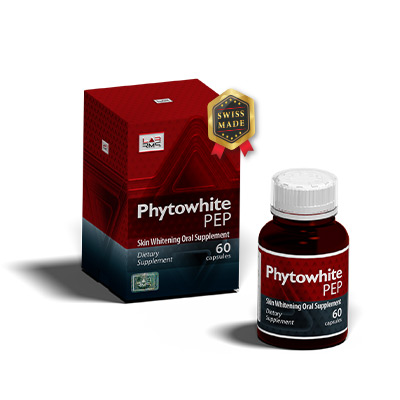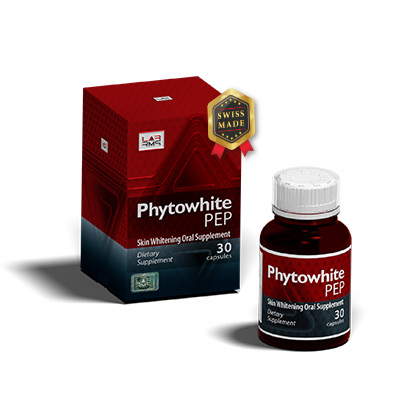Phytowhite PEP
FOR RADIANT, YOUTHFUL SKIN
Phytowhite PEP is a premium oral supplement specifically formulated to promote skin whitening, fight UV radiation, prevent and reverse premature aging of the skin, and cultivate radiant, youthful-looking skin. Its ingredients are derived from high quality super plants, refined into and potent yet vegan-friendly solution – a perfect complementary supplement to other plant-based products that promote skin health such as MF PLUS Vegetal Placenta Total Skin Rejuvenation & Revitalisation Program (VP TSRRP).
Phytowhite PEP contains Phytowhite Cell Extract and is fortified with Solanum lycopersicum Callus Cell, Vitis vinifera Extract, and Alpha Tocopherol, all of which work synergistically to significantly improve skin health and complexion, while also providing protection against free radicals and oxidative damage.
INCREASE
Increase protection against UV radiation, allowing the body to fight skin inflammation, support production of collagen and elastin.
REDUCE
Reduce absorption of UV radiation and inflammatory responses
IMPROVE
Improve skin hydration and elasticity for a more youthful-looking skin.
DOSAGE FORM:
Vegetal capsules, 550mg.
STORAGE:
Storage (°C): 25°C ± 5°C. Room temperature, keep away from sunlight.
RECOMMENDED CONSUMPTION:
2 capsules per day, preferably 30 minutes before a meal or 4 hours after a meal.
CONTRAINDICATIONS:
Recommended for 18 years old and above. For maximum efficacy, reduce coffee or alcohol intake as it may interfere with the bioactive absorption.
4 BEAUTY BOOSTERS FOR YOUR SKIN - WHAT'S IN PHYTOWHITE PEP
Phytowhite
Cell Extract
Whitening peptides and master antioxidant
Extracted from Saccharomyces cerevisiae cells, which possess powerful antioxidant properties that help to neutralize free radicals and protect from oxidative stress that may cause premature aging. Phytowhite Cell Extract plays an important role in maintaining intracellular thiol status and aids in liver detoxification. Also known for its potent whitening effect and reduction of hyperpigmentation through its anti-melanogenic properties and activation of the pheomelanin pathway.
Solanum
lycopersicum
Callus Cell
Photoprotective and anti-inflammatory
Solanum lycopersicum Callus Cell is extracted from high-quality tomatoes and their seeds. It is rich with Lycopene, Phytoene, Phytofluene, Beta carotene, Flavonoids and Vitamin C. Protein from the tomato seeds is converted into functional bioactive peptides via L. plantarum fermentation – these proteins are rich in globulin, albumin, protamine and gluteline, which possess high nutritional values and antioxidant properties. Solanum lycopersicum Callus Cells also provide protection against long-term and severe photodamage, in addition to soothing skin inflammation associated with irritation.
Vitis
vinifera
Wound healer and anti-wrinkle agent
Vitis vinifera is extracted from grapes; it contains a significant amount of phenolic compounds ranging from Anthocyanins, Tannins, and Resveratrol to Flavonoids, Triterpenoids, and Alkaloids, in addition being an excellent source of Vitamin C. The bioactive constituents of Vitis vinifera make it a great ingredient for promoting wound healing and the production of collagen that helps to diminish the appearance of wrinkles on the skin.
Alpha
Tocopherol
Skin protectant
Alpha Tocopherol is a fat-soluble antioxidant that is known to protect the skin from the various harmful effects of UV-induced free radicals. It shows a synergistic effect with Vitis vinifera in accelerating the wound healing process, and with Phytowhite Cell Extract in reducing skin pigmentation.
HOW PHYTOWHITE PEP GIVES YOU THAT HEALTHY GLOW
Phytowhite PEP’s potent active ingredients promote skin whitening and depigmentation, protect the skin against harmful rays, support the skin healing process, alleviate skin inflammation caused by environmental pollutants, and prevent premature skin aging – benefits that can be summarised into Phytowhite PEP’s 3Ps!
1. PROMOTE
Promote Skin Whitening, Minimizing of Hyperpigmentation
Oral consumption of Phytowhite PEP will augment the concentration of circulating thiol tripeptides in the body, stimulating the production of lighter pigment (pheomelanin).
The skin cells called melanocytes produce eumelanin and pheomelanin at different mixed ratios (eumelanin is a dark to brown colored pigment while pheomelanin is a red-orange pigment); the ratio of these two complex polymers determines skin color. An increased proportion of pheomelanin is typically associated with lighter skin color.
Constant exposure to UV radiation activates melanin production, which will eventually cause changes to the skin such as sun tanning and mottled pigmentation. When taken orally, Phytowhite PEP’s whitening peptides and antioxidants provide a protective effect against UV radiation, thus inhibiting and preventing an excessive accumulation of UV-induced melanin. These ingredients also help to neutralize free radicals and improve pheomelanin production.
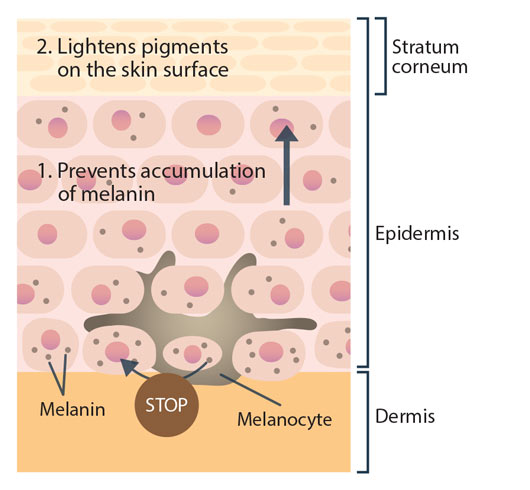
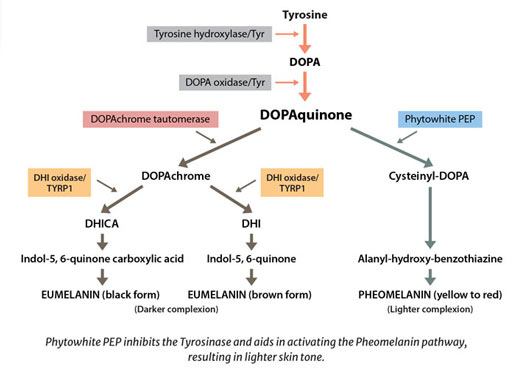
2. PROTECT
Protect the Skin Against UV Damage
Phytowhite PEP possesses antioxidant properties that protect the skin against damage caused by UV radiation. UV radiation can be categorized into two types: UVA and UVB. UVA rays penetrate the skin’s thickest layer and lead to premature aging skin and wrinkles, whereas UVB rays burn the superficial layers of the skin, resulting in sunburn and inflammation.
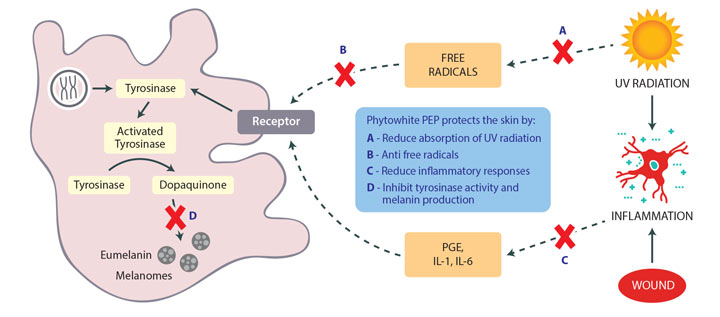
3. PREVENT
Prevent Premature Skin Aging
UV radiation is not only responsible for skin tanning and inflammation – it also causes major damage to stem cell DNA, which causes depletion of epidermal stem cells and extracellular matrix integrity. This will eventually lead to photo induced skin aging. In fact, 90% of signs of aging are caused by lifelong exposure to the sun. Common signs of premature skin aging include sunspots, inflamed skin, wrinkles, and dull and/or dry skin.
Phytowhite PEP’s unique formulation provides protection against UV radiation, allowing the body to fight skin inflammation, support production of collagen and elastin, and improve skin hydration and elasticity for a more youthful-looking skin.
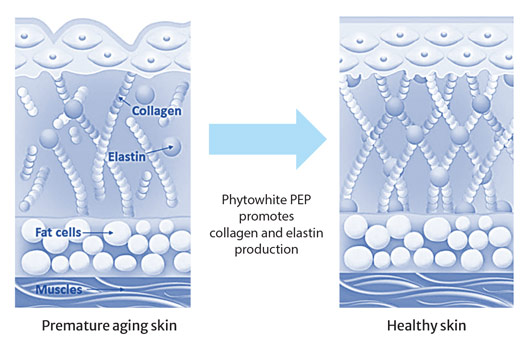
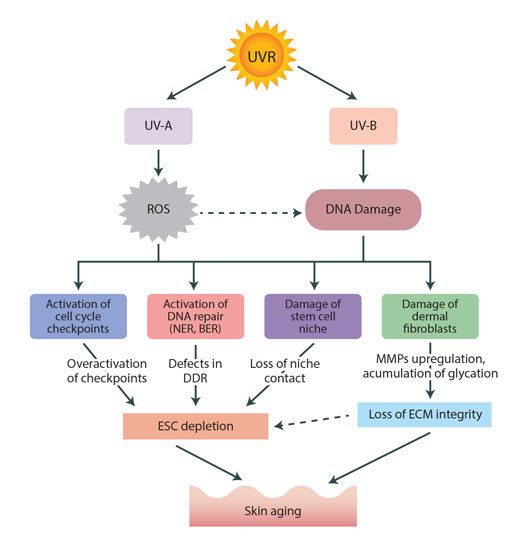
REFERENCES
Han, Mehmet & Saglıyan, Aydın & Benzer, Fulya & Kandemir, Fatih & GUNAY, C. & HAN, M.C. & Ozkaraca, Mustafa. (2012). Bene cial e ects of oral administrations of grape seed extract on healing of surgically induced skin wounds in rabbits. Revue de médecine vétérinaire. 163. 11-17.
Keen, M. A., & Hassan, I. (2016). Vitamin E in dermatology. Indian dermatology online journal, 7(4), 311–315. https://doi.org/10.4103/2229-5178.185494 Malathi, Munisamy & Thappa, DM. (2013). Systemic skin whitening/lightening agents: What is the evidence?. Indian journal of dermatology, venereology and leprology. 79. 842-6.10.4103/0378 6323.120752.
Manel Mechmeche, Faten Kachouri, Hamida Ksontini & Moktar Hamdi (2017) Production of bioactive peptides from tomato seed isolate by Lactobacillus plantarum fermentation and enhancement of antioxidant activity, Food Biotechnology, 31:2, 94-113, DOI: 10.1080/08905436.2017.1302888
Nayak, B. S., Ramdath, D. D., Marshall, J. R., Isitor, G. N., Eversley, M., Xue, S., & Shi, J. (2009).Wound-healing activity of the skin of the common grape (Vitis Vinifera) variant, cabernet sauvignon. Phytotherapy Research, n/a–n/a. doi:10.1002/ptr.2999
Nguyen, N. T., & Fisher, D. E. (2018). MITF and UV responses in skin: From pigmentation to addiction. Pigment Cell & Melanoma Research. doi:10.1111/pcmr.12726 Keen, M. A., & Hassan, I. (2016). Vitamin E in dermatology. Indian dermatology online journal, 7(4), 311–315. https://doi.org/10.4103/2229-5178.185494
Panich, U., Sittithumcharee, G., Rathviboon, N., & Jirawatnotai, S. (2016). Ultraviolet Radiation-Induced Skin Aging: The Role of DNA Damage and Oxidative Stress in Epidermal Stem Cell Damage Mediated Skin Aging. Stem Cells International, 2016, 1–14. doi:10.1155/2016/7370642


